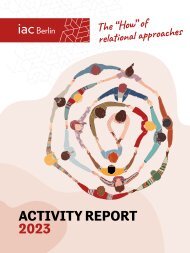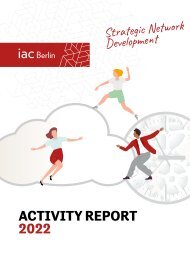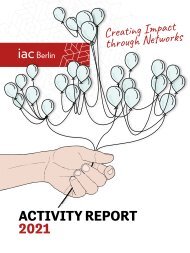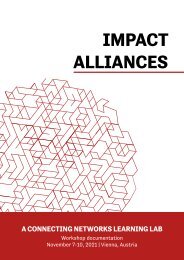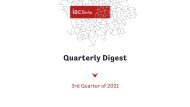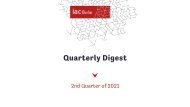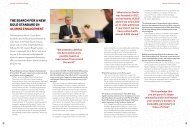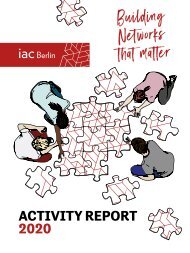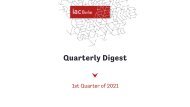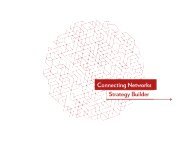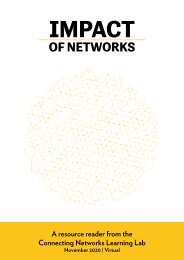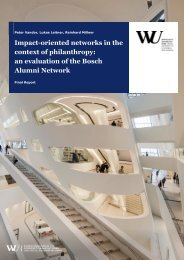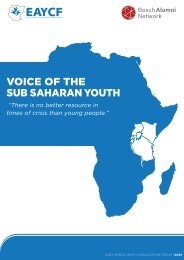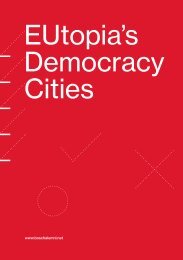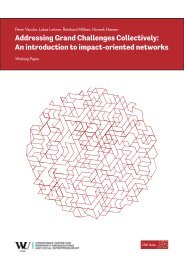Bosch Alumni Network - Driving Change
This publication provides an overview of the people, projects and topics within the network. It showcases its diversity and potentials and outlines opportunities to get involved.
This publication provides an overview of the people, projects and topics within the network. It showcases its diversity and potentials and outlines opportunities to get involved.
Create successful ePaper yourself
Turn your PDF publications into a flip-book with our unique Google optimized e-Paper software.
Participants collect<br />
“dos and don’ts” for<br />
the media coverage<br />
on migration.<br />
Dóra Diseri<br />
is an alumna of the program<br />
“Medien-Mittler zwischen<br />
den Völkern.” She currently<br />
works as project manager<br />
for “Reporters in the Field”<br />
at n-ost.<br />
When the iac Berlin announced the first<br />
Dušan, based in Belgrade, was our team<br />
and to enable better information flow<br />
open call for ideas within the Media Cluster<br />
member “in the field” who found the best<br />
between media in various EU coun tries.<br />
of the <strong>Bosch</strong> <strong>Alumni</strong> <strong>Network</strong> in spring<br />
locations in town and organized a tour to<br />
As a result of the several panels and<br />
2017, we immediately filled out the appli-<br />
the refugee center in Krnjača. Meanwhile,<br />
intense discussions, we wrote an advisory<br />
cation form and were thrilled when we<br />
all of us tried to find and invite experts and<br />
paper for journalists and NGO workers.<br />
Photo: Dóra Diseri<br />
found out our project had been chosen by<br />
the jury. However, we soon realized this<br />
was only the beginning of our journey and<br />
the hardest part was yet to come. With all<br />
of us working busy jobs, we skyped and<br />
chatted between assignments.<br />
Ivan tried to keep the whole group together<br />
by delegating tasks and briefing Lisa,<br />
who — together with the iac Berlin — provided<br />
huge support to us. They also enabled<br />
us to hold a face-to-face meeting in Berlin<br />
where we had time to finalize the speakers’<br />
list and choose the participants from the<br />
many alumni who had applied for the<br />
conference.<br />
journalists from the respective countries<br />
along the “refugee route.” Our aim was<br />
to have at least two representatives from<br />
each of those countries between Turkey<br />
and Germany: one from the media and one<br />
from the governance or NGO sector. We<br />
wanted to enable an exchange that wasn’t<br />
just cross-border, but also cross-sectoral<br />
— where we could analyze the role of the<br />
media in the social and political debates<br />
about the so-called “refugee crisis.”<br />
In the end, more than 60 people from 21<br />
countries came together in Belgrade to<br />
discuss current migration issues and problems<br />
plaguing the reporting on refugees<br />
After three days our conference ended,<br />
but the discussions did not. We are still<br />
planning to open a platform for sharing<br />
information and experience, debunking<br />
fake news and understanding processes<br />
in a transnational and cross-sectoral<br />
environment. This is because we believe<br />
covering crises shouldn’t mean focusing<br />
solely on “big events,” but also staying on<br />
the story when the “mainstream media”<br />
has already left.<br />
23




